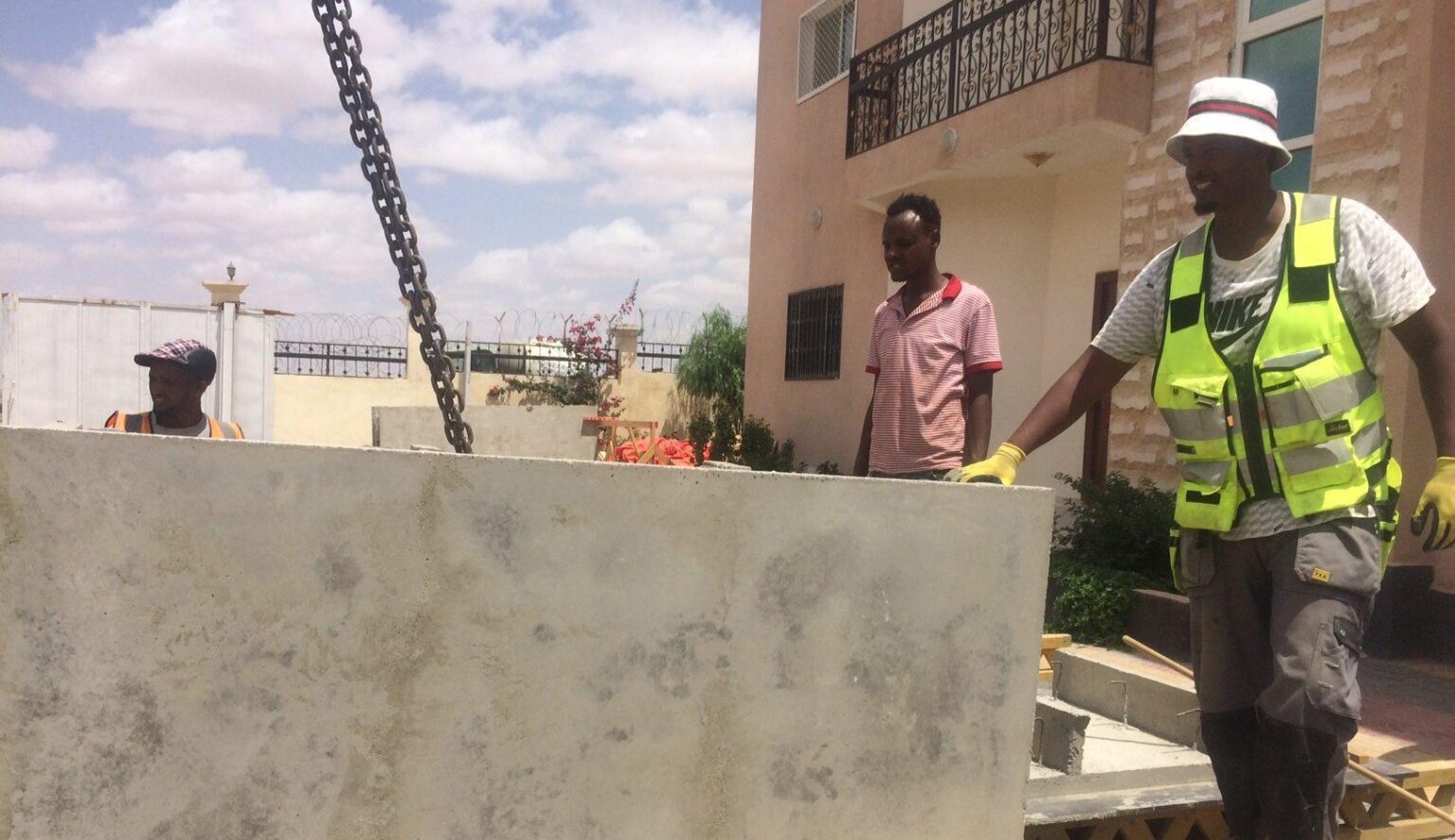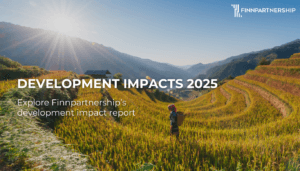The expertise and innovation of Finnish housebuilding and infrastructure brings success in African countries and India

Finnish companies are increasingly interested in offering innovative solutions for sustainable infrastructure and industrial construction in developing countries. Five companies that have received grants from Finnpartnership describe what the work is like in practice.
The UN member countries have agreed on Sustainable Development Goals to mobilise efforts to eradicate extreme poverty and support sustainable development until 2030.
The ninth goal (SDG 9: Industry, Innovation and Infrastructure) is to build sustainable infrastructure and promote sustainable industry and innovation. Companies that have received Business Partnership Support grants for their projects from Finnpartnership describe what companies can do to advance these goals while operating profitably.
Relieving the shortage of housing in developing countries
There is an acute shortage of inexpensive but sustainable, easy-to-erect housing in poor countries. The business concept of Finnish company Block Solutions Oy is to alleviate this problem. The company, based in Ylöjärvi, has worked with partners to develop a construction method based on small, lightweight modules that can boost local housing production and accelerate construction in crisis areas.
“The modules are made from biofibres and recycled plastic, and they are reminiscent of large Lego bricks. They are a sustainable, reusable material that is easy to use for construction without any tools. The modules can be moved around and, for example, a house can be extended as the family grows,” says Markus Silfverberg, Chair of the Board of Block Solutions.
The business is based on licences, which are sold to companies that deploy the Finnish company’s technology. According to Silfverberg, the focus is now on Africa.
First factories in Nigeria and Congo
The plan is to begin manufacturing the modules in Nigeria and the Democratic Republic of the Congo this year. Partner companies are also scheduled to begin production in Tanzania, Uganda and Kenya this year, but the coronavirus pandemic may postpone the start-up to next year.
In the initial phase, it will be necessary to import the manufacturing materials for the module into African countries. Silfverberg believes that the rate of local material sourcing will rise within a few years as the countries introduce facilities such as functional plastic recycling systems.
“Our vision is to have 200 factories manufacturing modules by 2026. We do not have the funds to enable such rapid expansion, so we are seeking to attract investors who specialise in sustainable development to finance local entrepreneurs.”
Local entrepreneurs need financing because each factory costs around one million euros – a substantial investment by local standards.
“However, this is the most cost-effective way to improve living conditions, as one factory is capable of manufacturing 300–500 houses a year.”
Prefabricated buildings for African conditions
The Somaliland region of Somalia is poor but exceptionally peaceful compared to the rest of the Horn of Africa. Increased housing production is a sign that conditions are stabilising. Finnish company BlueWhite Primos Oy has developed a method for manufacturing prefabricated concrete buildings which is compatible with local conditions. Harri Sarjanoja, the company’s CEO, calls the business idea a “mobile house factory”.
“The prefabricated elements are manufactured using a workstation that is easy to move from one place to another. For larger projects, it is easier to manufacture on-site than to transport elements long distances,” Sarjanoja explains.
These are no ordinary concrete elements: Sarjanoja says that the weather conditions in Somaliland have been taken into consideration. The sun shines during the day, and temperatures rise. It can be much cooler at night.
“Our technology is based on sandwich elements. Air flows in a gap between the element shells, insulating the hot and cold. This saves a considerable amount of energy because there is less need to use air conditioners.”
Finnish company employs local builders
BlueWhite Primos has found it easy to set up in Somaliland because one of the company’s six owners is of Somali descent. In a little over a year, the company has completed a few house projects on the turnkey principle.
The company is responsible for the foundations, erecting the prefabricated element walls and building the roof, as well as for project management. Local contractors are responsible for the finishing work. “The majority of the customers have been Somalis who have lived elsewhere but are now returning home.”
BlueWhite Primos employs 15–25 people in Somaliland, depending on the order book. Sarjanoja highlights the importance of training and orientation, as there are very few construction professionals in Somaliland.
The company aims to become involved in construction projects where entire residential areas are constructed. Aid organisations operating in Somaliland also employ construction contractors.
“However, we are still too small to become a partner of the UN or other big organisations. We have set ourselves the goal of building larger sites which are compatible with the mould technology.”
Sarjanoja believes that the company’s successes in Somalia will act as a reference to enable the business to take off in other parts of Africa in the future. The company is currently in negotiations in Ethiopia and Kenya with the aim of identifying local partners interested in acquiring the mould technology.
The business environment in Somaliland is challenging, but Sarjanoja encourages Finnish companies to seek opportunities there. Commitment and a close local presence are essential. “We have been welcomed. Together with Primos Somaliland Construction Company, the sister company we have established, we are building energy-efficient houses and teaching people how to make them. This is our way of building society and offering solutions that were not previously available in Somaliland.”
Supplementing construction expertise in Uganda
Uganda, in East Africa, is also suffering from a shortage of sustainable housing and construction expertise. This has caught the eye of Janne Nielsen, who works with local partners to build and sell residential properties in the country’s capital, Kampala. In Finland, Nielsen has his own estate agency in Mäntsälä.
“We have built a four-unit terraced house in Kampala. We have a plot of land for our next project, but the coronavirus pandemic has delayed the commencement of construction,” Nielsen says. Nielsen’s local partners in Uganda are responsible for the practical implementation of construction projects.
“We have created an effective management model in Uganda. We are also training the employees working on our projects. There are plenty of young people who are keen to learn, but it is necessary to start from the very beginning with certain matters, such as occupational safety.”
Nielsen also aims to improve local trading practices so that residential properties are sold to customers during the construction phase. This frees up capital for construction companies to focus on new sites. “To change the local trading practices, we will need to have more illustrative online material about the properties we are selling, including 3D mock-ups.”
Nielsen recently set up a joint venture with his Ugandan partners. The first housing projects were built for relatively wealthy families. In the future, the company aims to produce housing for the growing and increasingly prosperous Ugandan middle class.
Alleviating the electricity shortage in Rwanda
The demand for electricity is increasing rapidly in Africa, but the limited generating capacity and ineffective transmission systems mean that blackouts are a part of daily life for millions of people. BaseN Oy, a company specialising in real-time metering technology and data network design, has supplied a system in Rwanda to make the construction of electricity grids more efficient.
“Our solution enables infrastructure projects to be tracked in real time, thereby improving the flow of information between different parties. This increases cost-efficiency and helps to keep projects on schedule,” says Carlos Canto, BaseN’s Chief Sales Officer.
Rwanda, located in Central Africa, has been the continent’s fastest-growing economy in recent years, and the country has made major investments in its electricity grid and other infrastructure. However, GDP per head is still less than $800 per year.
“As a company, we can help a poor country use its limited resources more effectively and build more reliable infrastructure.”
BaseN’s customer is Rwanda Energy Group, a state-owned company which is responsible for electricity generation and distribution and which is building transmission networking using local contractors. The system operator can make use of the up-to-date information, but the project and site managers also benefit, as well as the consultants providing expert help. Information is also available to the building supervision authorities and the project’s investors.
According to Canto, an essential aspect of BaseN’s operations in Rwanda is to train the project parties on how to use the new technology. Alongside IT expertise, local competences in areas such as process management, work quality assurance and occupational safety is also improving.
BaseN is establishing a subsidiary in Rwanda, and it aims to obtain new customers. “We are also seeking opportunities in other African countries.”
Raising the profile of civil protection in India
The solutions used to protect the population and industrial sites in developed countries like Finland are of a high standard, but in developing countries, there is usually plenty of room for improvement.
Temet Oy, a developer of protection solutions, is raising awareness of the protection of functions that are vital to the population and society in the event of a crisis or accident. “We have been doing business in India for well over a decade now, but our customers have so far been from the defence administration. Now, we are seeking new customers in fields such as petrochemical production plants and nuclear power plants,” says Ilkka Kivisaari, Temet’s CEO.
Temet’s products are also suitable for protecting sites such as data centres. Reliable telecommunication connections are important for everyone in India, where smartphone use is on the rise. The IT industry – an important sector for India – also requires secure data connections.
Temet has previously worked with a reseller in India, but the Finnish company recently established its own subsidiary in the country. The company has also examined ways of manufacturing components locally. “In the initial phase, we will subcontract some activities to a local partner with manufacturing expertise and relationships with end-customers. Product certification and quality control will remain in Temet’s hands.”
According to Kivisaari, the local regulations state that civilian shelters are not mandatory in buildings such as blocks of flats or commercial properties. Temet aims to raise awareness among the authorities and the general public of the importance of risk management in these matters. “In the industry, the widespread adoption of protective solutions has long been hampered by outdated standards. We have visited several companies and audited sites. It is clear that many places have been relying on good luck when it comes to safety.”
First picture: BlueWhite Primos Oy
Share on social media


